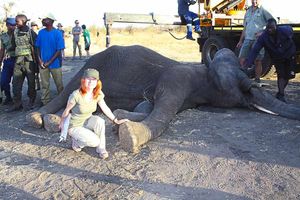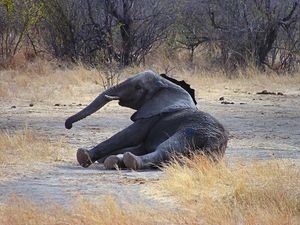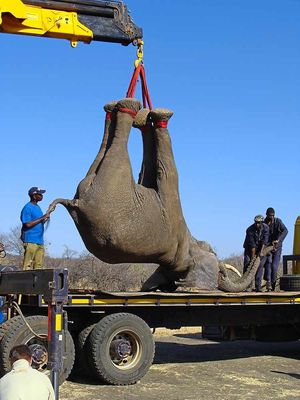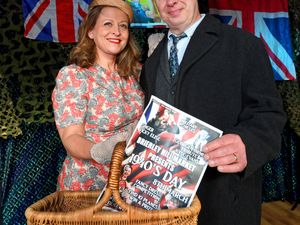What it's like to... Help relocate 10 elephants
They say elephants never forget and the same is also true for Gilli Hale who will always remember her time helping the gentle giants of the animal kingdom.

Last month she was part of a team of conservation volunteers who travelled from across the globe to Zimbabwe.
They had been recruited to help move 10 bull elephants from a small reserve to a bigger one.
For 52-year-old animal enthusiast Gilli, from Bilston, Wolverhampton, it was a 'once in a lifetime' experience that was too good an opportunity to miss.
"I have a life-long passion for wildlife and conservation and fell in love with Africa when I went on a safari in Kenya two years ago for a 'big' birthday.
"So when the opportunity to go back to Africa and work with wildlife came up I took it," she explains.
Based near the town of Victoria Falls, Gilli was one of 20 volunteers – 19 women and one man – who came from across Great Britain, the USA, Canada and Australia. They were there for two weeks assisting the Nakavango Conservation Programme, living in basic accommodation and camping in the bush.
Working alongside a small team of vets, ground crew and rangers and headed by the reserve manager, their mission was to move the bull elephants to another site where they could start a new life and hopefully breed with the females there.
Each day they would be split into two teams and would take it in turns to participate in the operation and observe.
Gilli says: "The 'Ellie Op' itself ran for a week. We would be up at 5.30am, be on the road at 6.30am to meet up with everyone at 7am.
"One of the vets would then get in the small chopper to find a suitable bull.
"It would then be darted. Once the call came over the radio, the active team would have to race to where it went down. Some would be in a clearing near the track but others would fall asleep a long way into the thick scrub.
"If this happened, the observing team would literally have to chop down trees in order for a path to be made for the trucks to get to the elephant. Once we had found the sleeping pachyderm, and they could be easy to miss, we would each have a specific role to play.
"Someone would have to take its temperature, check its breathing, take photographs for identification or spray water to keep him cool.

"A flat-bed truck would be driven along side and the animal would be hoisted up by a crane – upside-down.
"A couple of us would then ride on the truck with the vet to the release site – a waterhole over a railway line.
"There the bull would be lowered to the ground, checked over and an antidote given. At this point we all had to retreat to the trucks as elephants can be aggressive.
"Some woke up very quickly whilst others took a while. But they all walked off to their new life without any concerns.
"The quickest relocation took exactly one hour whilst the longest was over three hours, due to the ellie going down a long way from the road. Some fell asleep sitting up –which was a really strange sight," explains Gilli, who works in the events team at the Library of Birmingham.
"It became quite normal to get up each day, go out to find an elephant and then move it.
"Everybody had to muck in, whether it was chopping down trees or carrying heavy equipment, and we got quite filthy by the end of the day."
Gilli, who paid around £3,000 to take part in the project which covered costs including flights and accommodation, said having the chance to get so close to the mammals was an 'amazing experience'.
"I got to hold on to one's trunk and on one occasion the elephant went down wedged in a tree and had to be kept cool for a long time. This required myself and another volunteer to 'flap' its ear for 25 minutes. Even an elephant's ear is heavy," says Gilli.
"Elephants are actually quite hairy. I had never thought of an elephant being hairy but they have all of these sensitive hairs on their trunks," she adds.

Looking back on her time in Africa, Gilli says what she had experienced during the fortnight only really started to sink in when she returned home.
"At the time I was concentrating on my jobs each day but afterwards I kept thinking 'did I really help to move elephants out in the wild?'. It's incredible," she adds.
If anyone is considering doing something similar, Gilli says she would definitely recommend they take the plunge.
"It was hard work but very rewarding and fulfilled a long-held ambition to do wildlife conservation.
"I met a great bunch of people, who I will remain in touch with, and have special memories that will last a lifetime.
"I would urge anyone who dreams of doing something extraordinary to grab the chance – it will always be something to look back on. Hard to believe now that just a few weeks ago I was sitting on a wild elephant!"
By Heather Large




